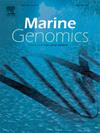Complete genome and carbohydrate-active enzymes of Arenibacter antarcticus KCTC 52924T isolated from deep sea sediment of Ross Sea, Antarctica
IF 1.5
4区 生物学
Q4 GENETICS & HEREDITY
引用次数: 0
Abstract
Members of the genus Arenibacter were widely distributed in oceanic habitats around the world and have been studied for a variety of useful properties, including antigen deactivation, pollutant degradation, and the production of antimicrobial agents. Arenibacter antarcticus KCTC 52924T of our interest is an aerobic, non-motile, Gram-negative, psychrotolerant type strain isolated from the deep-sea sediment of Ross Sea, Antarctica. The extreme conditions of this habitat are believed to have diversified the substrate spectrum and range of operational conditions of the enzymes, offering both scientific interest and potential industrial benefits. Here, we obtained the complete genome sequence of this promising strain, which consists of 4,694,007 bp (G + C content of 38.8 %) with a single chromosome, 3917 protein-coding genes, 43 tRNAs, and 3 rRNA operons. The functional annotations of the genome reveal four metabolite biosynthesis clusters and a variety of carbohydrate-active enzymes with potential biotechnological applications. Additionally, several interesting features related to environmental interactions were identified. Therefore, this genome data and its genomic potentials figured out in this study serve as a conner stone in further study aimed at understanding physiology of this strain which may be valuable in biotechnological purpose.
从南极罗斯海深海沉积物中分离出的南极 Arenibacter antarcticus KCTC 52924T 的完整基因组和碳水化合物活性酶
Arenibacter 属的成员广泛分布于世界各地的海洋栖息地,其各种有用的特性已得到研究,包括抗原失活、污染物降解和抗菌剂的生产。我们感兴趣的南极 Arenibacter antarcticus KCTC 52924T 是一种从南极罗斯海深海沉积物中分离出来的需氧、非运动、革兰氏阴性、精神耐受型菌株。这一栖息地的极端条件被认为使酶的底物谱和工作条件范围多样化,从而带来了科学兴趣和潜在的工业效益。在这里,我们获得了这一有潜力的菌株的完整基因组序列,该序列由 4,694,007 bp(G + C 含量为 38.8%)组成,具有单条染色体、3917 个蛋白质编码基因、43 个 tRNA 和 3 个 rRNA 操作子。该基因组的功能注释揭示了四个代谢物生物合成簇和多种具有潜在生物技术应用价值的碳水化合物活性酶。此外,还发现了一些与环境相互作用有关的有趣特征。因此,本研究中发现的基因组数据及其基因组潜力可作为进一步研究的基石,旨在了解该菌株的生理机能,这可能在生物技术方面具有重要价值。
本文章由计算机程序翻译,如有差异,请以英文原文为准。
求助全文
约1分钟内获得全文
求助全文
来源期刊

Marine genomics
生物-遗传学
CiteScore
3.60
自引率
5.30%
发文量
50
审稿时长
29 days
期刊介绍:
The journal publishes papers on all functional and evolutionary aspects of genes, chromatin, chromosomes and (meta)genomes of marine (and freshwater) organisms. It deals with new genome-enabled insights into the broader framework of environmental science. Topics within the scope of this journal include:
• Population genomics and ecology
• Evolutionary and developmental genomics
• Comparative genomics
• Metagenomics
• Environmental genomics
• Systems biology
More specific topics include: geographic and phylogenomic characterization of aquatic organisms, metabolic capacities and pathways of organisms and communities, biogeochemical cycles, genomics and integrative approaches applied to microbial ecology including (meta)transcriptomics and (meta)proteomics, tracking of infectious diseases, environmental stress, global climate change and ecosystem modelling.
 求助内容:
求助内容: 应助结果提醒方式:
应助结果提醒方式:


